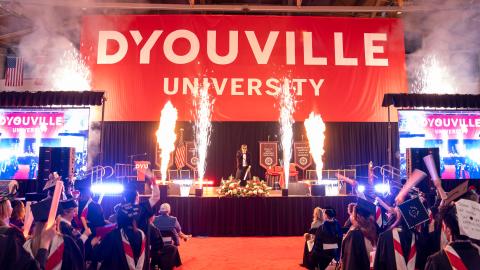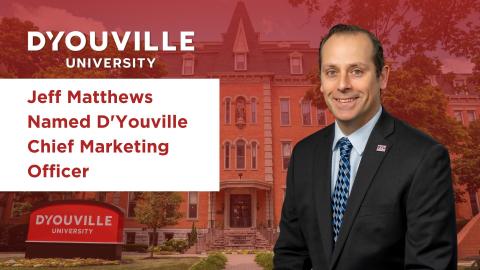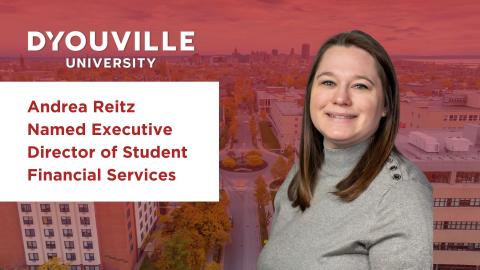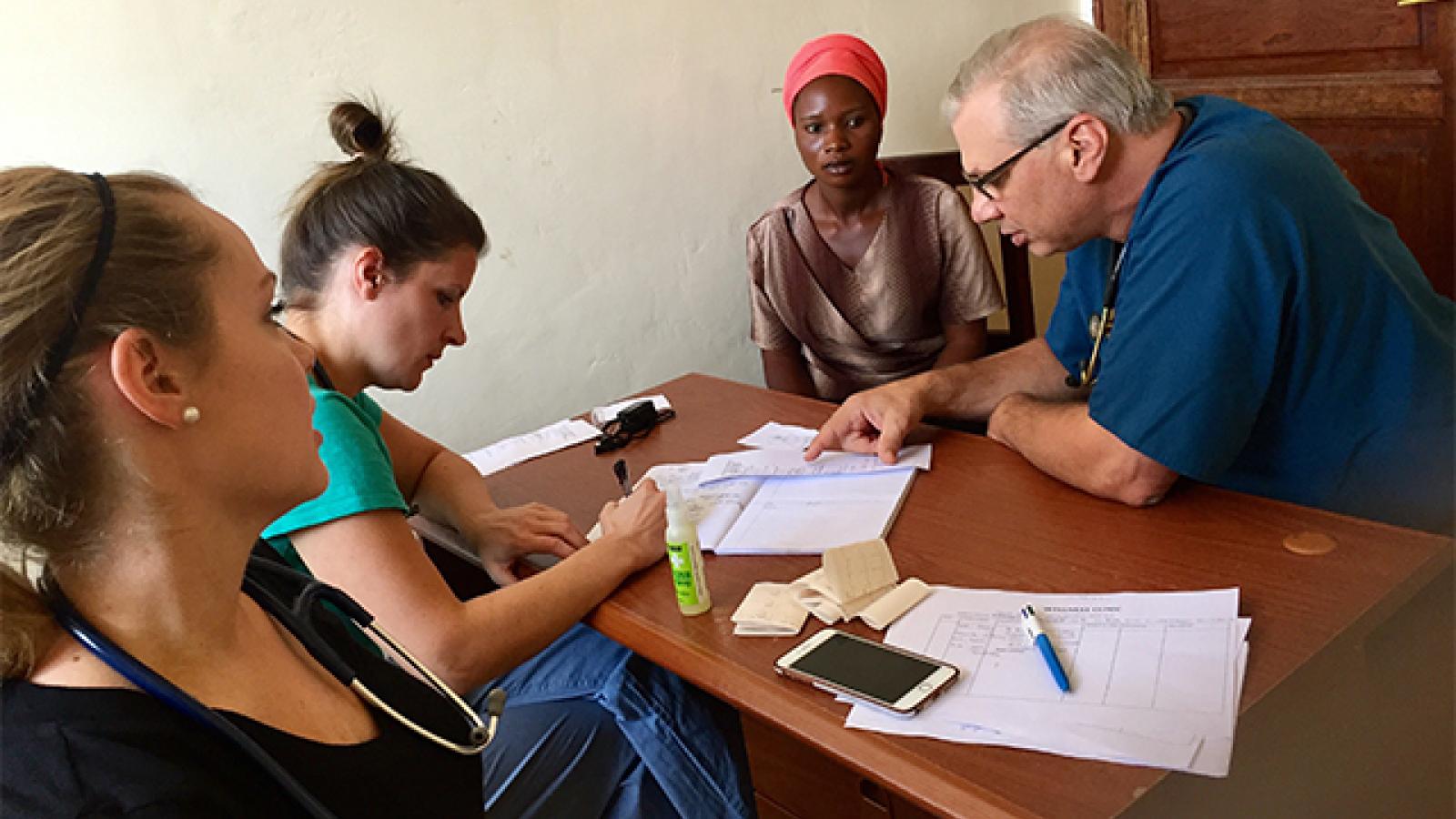
It’s time to fill out your FAFSA for 2025-2026! D’Youville School Code 002712.
Teaching and Healing: From the Classroom to the Other Side of the World

Teaching and Healing: From the Classroom to the Other Side of the World
Bending over microscopes at the clinic in Sierra Leone, two American students from D’Youville College looked for indications of typhoid fever or malaria.
“They won’t get a chance to do THAT back here,” says Paul Violanti, assistant clinical professor in the School of Nursing at D’Youville, and an organizer for the mission trip to the impoverished African nation.
The young women were among a handful of students who have joined Violanti on three medical mission trips to Africa — to clinics in Sierra Leone and in the Democratic Republic of Congo. At the clinics, the students assist with patient care and help train the local staff on how to use new equipment and other supplies.
It is an education for all involved.
If he could, Violanti says, he would have every D’Youville student go on one of the missions, which he sees as a chance to serve, effect change and grow as individuals.
The mission trips are not a direct part of Violanti’s coursework at D’Youville, where he has taught in the nurse practitioner program for 18 years. The overseas aid mission is an outgrowth of Violanti’s other job, at Jericho Road Community Health Center. The nonprofit operates three community healthcare centers in Buffalo for poor residents, including the growing refugee population.
Violanti, who also sees patients at the clinics, is Jericho Road’s director of global health programs. His October 2018 visit to Africa was his 26th medical mission.
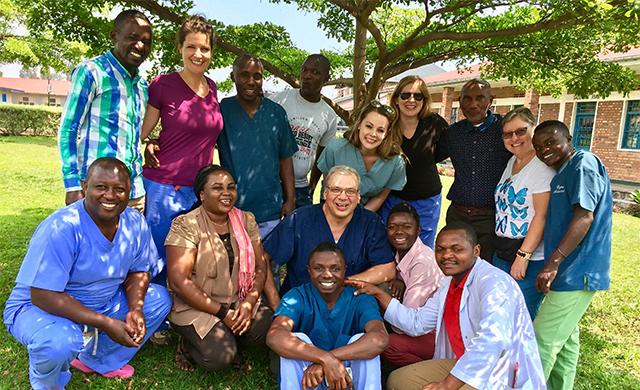
Paul Violanti, assistant clinical professor in the School of Nursing, visits a clinic in the Democratic Republic of Congo.
His first foray abroad was to Mexico, before he became part of Jericho Road. From the start, Violanti was hooked.
He describes how an elderly woman in the rural Mexican village was disabled by a serious infection. After treating her with antibiotics — medicine easily available at any drugstore in the United States — she was cured. The result seemed so miraculous that Violanti’s group became instant heroes in the village, while the mission workers themselves were humbled by the great need they saw all around them.
Since then, Violanti has been part of Jericho Road’s establishment of clinics in Africa and beyond. Most recently, he traveled with a small group (no students) to an isolated region in Nepal, accessible only by narrow roads cut into the mountainside. Their destination was the Himalayan villages of Hagam and Hapra, at 8,000 feet, near the border with Tibet and about 70 miles from Mount Everest.
Most of the 3,000 inhabitants are farmers who cultivate terraced gardens built on the steep slopes.
It is picturesque and peaceful, home to a different kind of poverty from that surrounding the African clinics that Violanti had worked in previously.
“There’s no war — no ongoing conflict — and clean water is readily available,” Violanti said. There also aren’t the dangerous insects, snakes and other animals that thrive in the more tropical climates.
The hardship comes largely from the villages’ environmental extremes and their isolation. The nearest hospital is a day’s walk down the mountains.
“People don’t realize how the rest of the world lives,” Violanti says. The violence and hardship faced by much of the world’s population are unfathomable to many Americans, he believes.
For students in D’Youville’s medical programs, the neighborhood journey to Jericho Road is much more manageable than getting to Africa. The ministry’s first clinic opened more than 20 years ago on Barton Street, on Buffalo’s West Side, less than a mile and a half from campus. Dr. Myron Glick, raised in a Mennonite family, began the clinic on a dream and a prayer as a Christian outreach to the city’s poor.
Within a few short years, the neighborhood clinic also was welcoming a surge of refugees from Burma, Bhutan, the Middle East and Central Africa.
The work environment at the Jericho Road clinics is different from a typical medical office, Violanti said, since it is affected by the experiences of the refugees who they serve. Many patients were victims of war or other violent trauma. Torture was not uncommon in their home countries, and so trust in others does not come easily.
“That’s why it’s so important to take students to Jericho Road and overseas,” he said. “They can see all these people. I make sure they talk to the patients, to hear their stories.”
Violanti said he and former D’Youville President Sister Denise Roche used to talk “all the time” about the important role of the college in serving the people in the community around the campus. Current D’Youville President Dr. Lorrie Clemo continues that interest. She has visited Jericho Road and Violanti said it could be a possible model for how the college’s planned HUB clinic might operate.
There already is significant interaction between the two West Side anchors of college and clinic. Violanti said Jericho Road sees patients who also are D’Youville students, and students from the college’s pharmacy and family practice programs do internships and clinicals at Jericho Road.
And some students continue that relationship after graduation. Among the D’Youville alum on staff are Heather Kim, NP, and Takesha Leonard, FNP, administrators at two Jericho Road clinics.
“Technically, they are my bosses,” Violanti jokes.
In reality, the work D’Youville students, grads and Violanti perform is one small part of a large collaborative effort to bring good quality healthcare to people who otherwise would go without. Violanti points out that Jericho Road now employs people who first came there as patients, among them refugees who went on to get degrees at D’Youville and elsewhere in medicine and healthcare.
The mission to Sierra Leone began through Phebian Abdulai, who was studying nursing in Sierra Leone when she was forced to flee its civil war. After arriving in Buffalo in 2001, she completed her degree and worked at Jericho Road.
Eventually, she felt the call to return home, and with the help of Jericho Road and others, a clinic named for her mother, a midwife, was built. Congolese refugees likewise drew awareness to the need in their homeland, and there is now a clinic in Goma.
The Nepal mission has its roots in a serendipitous meeting between Violanti and a Nepalese couple at a conference in Kentucky. Arjun and Maya Bhattarai decided to move from Ohio to Buffalo after hearing from Violanti about the Bhutanese refugees who were being resettled here. Both Bhattarais now work at Jericho Road, where she is a nurse practitioner and he is a care coordinator.
They and Purna Tamang, a pastor and Bhutanese refugee who works at Jericho Road, pushed for the Nepal mission effort after the 2015 earthquake that destroyed towns and villages, killing thousands.
When he first went to Nepal in 2017, Violanti said, the team saw more than 300 patients. In March 2018, they returned and saw 500 people. A local property owner also has provided a small building to house the clinic and store supplies.
Now, the mission program is supporting the work of a local Nepali pastor and medical provider who travel to Hagam by motorbike twice a month, spending about five days there each visit.
From the classroom to the West Side clinic to the Himalayas, the work is a powerful example of collaborative health care combining on every level, at home and around the world.
Contact
Marketing & Communications Department
Email: marcom@dyc.edu
